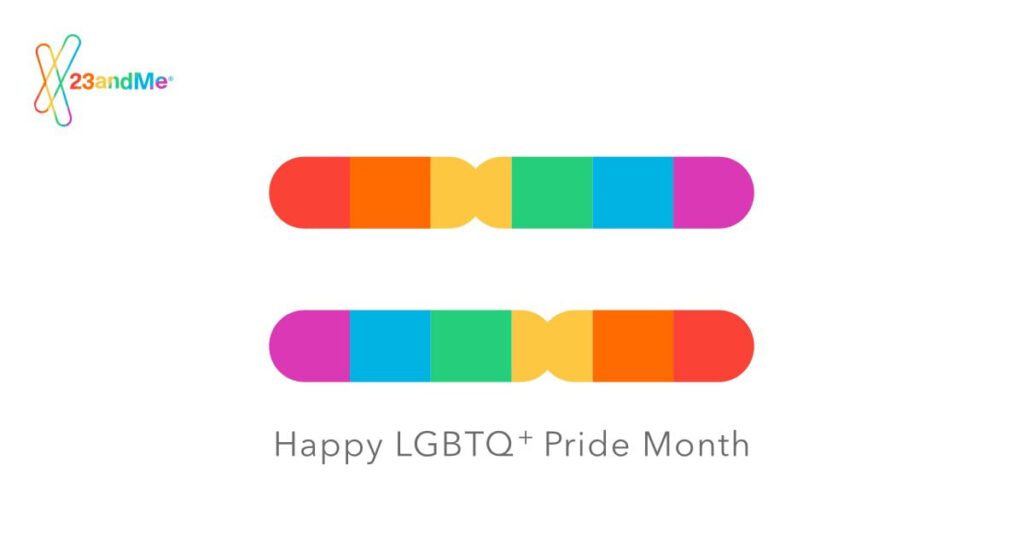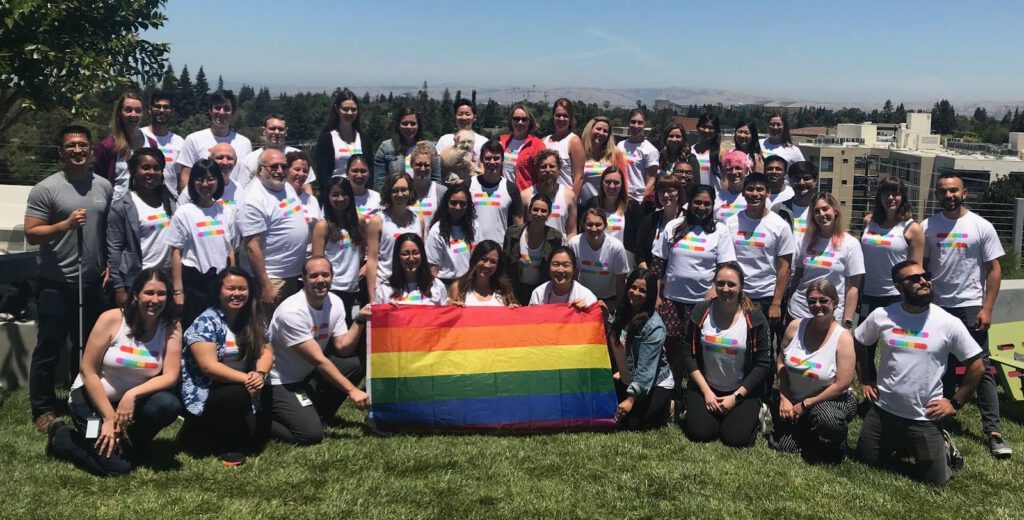By Jey McCreight, PhD, Research Communications Scientist at 23andMe
Happy Pride! As June comes to an end, we’d like to take a moment to celebrate our LGBTQ+ research participants and employees. Whether they’re contributing data or analyzing it, the quality of our science wouldn’t be the same without them.
Latest Research
This is especially true for one of our latest research projects. Forming relationships is such an essential part of the human experience. With this in mind our Research Team is currently conducting a genome-wide association study of sexual orientation with a number of collaborators.
While investigating the genetics of sexual orientation is frequently controversial, we believe that good science can combat misinformation. For example, there is a common misconception, known as genetic essentialism, that genes completely and immutably determine traits. The reality, however, is that sexual orientation is 30 to 40 percent heritable. That estimate comes from studying identical and non-identical twins.[1] That range of heritability is similar to other traits such as being introverted or extroverted.
A Complex Trait
The genetic component is not due to a single “gay gene.” Rather it is a complicated architecture of many genetic variants contributing small effects. This is also due to the fact that sexual orientation is a very complex trait that encompasses many different aspects such as sexual attraction, sexual experience, and sexual identity. Given this moderate heritability, it’s likely that some people who identify as sexual minorities do not have the (yet to be discovered) genetic factors that associate with differences in sexual orientation. Similarly, it is likely that among people with these genetic factors, many identify as straight.
 We want to make clear that studying sexual orientation by no means implies that same-sex attraction is a disease. That’s is an antiquated, harmful, and false idea. We are studying sexual orientation because we want to learn more about what makes us human. It’s also why we study how we feel empathy, or what determines hair color, or whether we like or hate cilantro. As a member of the LGBTQ+ community who is both a 23andMe scientist and research participant, I’m excited to learn more about what makes me, me.
We want to make clear that studying sexual orientation by no means implies that same-sex attraction is a disease. That’s is an antiquated, harmful, and false idea. We are studying sexual orientation because we want to learn more about what makes us human. It’s also why we study how we feel empathy, or what determines hair color, or whether we like or hate cilantro. As a member of the LGBTQ+ community who is both a 23andMe scientist and research participant, I’m excited to learn more about what makes me, me.
While the science of sexual orientation is moving forward, the field of STEM (Science, Technology, Engineering, and Math) has some catching up to do. When hostile environments push people out of STEM fields, we lose great minds that could have made the next big discovery. Unfortunately, this is not a hypothetical situation for many LGBTQ+ individuals.
Discrimination
For example, it’s still legal for employers to discriminate against someone for their sexual or gender identity in 28 states.[2] With the fear of being fired, harassed, or ostracized looming overhead, it’s unsurprising that over 40 percent of LGBTQ+ identified workers in STEM fields are not “out” to their colleagues.[3] “Out” LGBTQ+ workers are less likely to experience anxiety, isolation, and the feeling that their career has stalled compared to their closeted coworkers.[4]
Despite this, among “out” STEM faculty members, about 70 percent still felt uncomfortable in their department and were approximately 7 times more likely to experience exclusionary behavior by their colleagues.[5]
Even before beginning their careers, LGBTQ+ students are being lost from STEM fields. Undergraduate sexual minority students are 7 percent less likely to be retained in STEM compared to switching into a non-STEM program.[6] This is despite these students being more likely to have worked in a lab than their heterosexual counterparts, which is typically associated with retention in STEM fields.
23andMe’s Commitment
23andMe values diversity and makes it a priority to ensure that both our product and workplace are inclusive. Our Product Science team is currently working on separating biological sex and gender identity on user profiles. This is to make our product more inclusive to trans* and non-binary individuals. We’ve also shown our support by offering the same health care benefits to same-sex partners of employees. 23andMe recently sponsored the Lesbians Who Tech Summit. We’re also printing rainbow chromosome shirts for Pride.
“At 23andMe we’ve always believed that the best science happens when everyone has the opportunity to participate,” says Anne Wojcicki, 23andMe CEO and co-founder. “We value all of our LGBTQ+ customers and employees and thank them for being an important part of our community!”
Fun shirts won’t single-handedly change the world, but letting employees know they can be proud of who they are is completely worth it. The communities I grew up in weren’t always supportive, but now I feel so lucky to work somewhere where LGBTQ+ individuals are welcomed and celebrated by our allies.
[2] http://www.hrc.org/state-maps/employment
[3] Jeremy B. Yoder & Allison Mattheis. (2016) Queer in STEM: Workplace Experiences Reported in a National Survey of LGBTQA Individuals in Science, Technology, Engineering, and Mathematics Careers. Journal of Homosexuality, 63:1, 1–27, DOI: 10.1080/00918369.2015.1078632
[4] https://hbr.org/2011/07/for-lgbt-workers-being-out-brings-advantages
[5]https://www.researchgate.net/publication/262989539_Factors_impacting_the_academic_climate_for_LGBQ_STEM_faculty
[6] http://advances.sciencemag.org/content/4/3/eaao6373.full